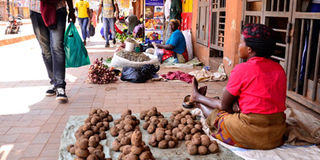Government lockdown leaves many stranded financially

Selling. Women display foodstuffs for sale along Luwum street in Kampala on APRIL 1, 2020. PHOTO BY ABUBAKER LUBOWA.
What you need to know:
- This followed earlier communication from President Museveni in his televised address to the nation on Monday that government was going to distribute food and other relief items to vulnerable people following the lockdown.
The move by government to put total lockdown on most sectors of the economy has sent several into vulnerable conditions and appalling despair.
Ms Rosemary Nabwire is a slum dweller in Makindye, Kampala has found herself a beggar following lockdown.
“I was working in a restaurant in town but when the lockdown happened, I was laid off by my boss,” she narrates.
“In a day, I would get Shs6,000 and spend 4,000 to buy food at home and use the rest for transport and medicine,” Ms Nabwire, who is also pregnant said.
“I had not saved any money and right now I am getting support from my neighbours. I wanted to go back to our home in Jinja as my husband has also deserted me,” Nabwire adds.
“The biggest problem is that I can’t even travel back to my paternal home since transport is suspended,” she said.
Mr Richard Obbo, a neighbour to Nabwire says life is becoming harder for her.
“Everything is hard. You see we have been reduced to waking up in the morning and sitting home because there is no work,” he says.
Obbo adds: “The landlord is also on our neck to pay rent. Government should speak to these landlords and also enforce the directive that prices of commodities should not be increases.”
“We are buying sugar at Shs4,800 up from Shs3,200 per kilogramme before lockdown. Government should do something for us,” he said.
Ms Fiona Makumbi was operating a bar at Kasanvu zone in Makindye in Kampala. She says following the lockdown, life has turned upside down.
“I am a single mother with five children. The worst thing is that I can’t start doing something new to feed my children and I don’t know when the lockdown will end,” she says.
“”For the last four days, I have failed to buy food,” Makumbi added.
Mr Fahad Nsubuga, the executive director of Child Love Uganda that operates in Makindye said, they had been supporting vulnerable people in the area but government suspended their operation.
“We informed the parents we work with that we won’t work with them anymore following the suspension by government of our work,” he said.
Byibehho Richard, the chairperson LC1 of Kasanvu Zone in Makindye where the dwellers live, said engagements were ongoing with landlords to give time for people who are stuck and can’t pay.
“I have over 3,000 people in my area and most of them rely on daily income. Government should give us posho, rice, beans and soap,” he said.
Background
Ms Betty Amongi, the Minister for Kampala and Metropolitan affairs, in a press statement on Tuesday said they are making assessment to determine the specific vulnerable groups within the city to get the relief food.
“We are mapping areas with most vulnerable people in the time when businesses are closed,” the minister had said.
“We are looking at a number of groups including street children to benefit from the relief food,” she had added.
Mr Matin Owor, the commissioner of disaster preparedness and management at the Office of Prime Minister said government was going to give 6kg of posho and 3kg of beans per head to affected people in urban areas.
He said the request had already been made to Finance ministry and that distribution would start anytime when the money is received.
This followed earlier communication from President Museveni in his televised address to the nation on Monday that government was going to distribute food and other relief items to vulnerable people following the lockdown.
He said government was going to donate beans, maize and a packet milk.
He, however, warned “opportunistic politicians” against distributing the above items to communities, saying they will be arrested.



